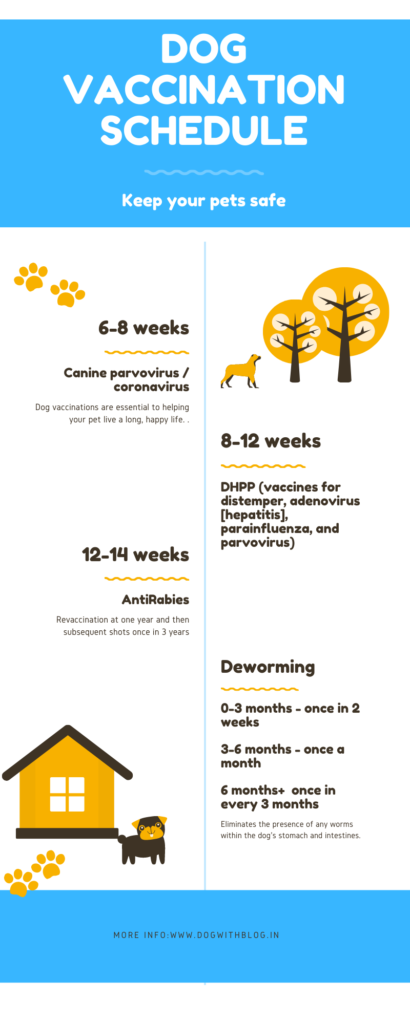
While it is amazing to show your dog around, indulge in playtime and contemplate training and travel with him, there’s more to pet parenting and it includes the ‘boring stuff’ too. But as with life, the relatively dull things are often for the best and routine vet visits are just as critical as your visits to the dentist.
Once you have settled down on a name for your dog, perhaps the next most critical step is to get your good boy (or girl) vaccinated.
Why you should vaccinate your dog?
Dog vaccinations protect dogs from preventable serious diseases and act as a guard against disease by exposing pets to disease-causing microorganisms (inactive or modified) so that they don’t produce the disease in question. By introducing the dog to this controlled stimulus, their immune system can build a defense against future exposure. Just as in the case of human vaccinations.
Vaccinations are essential to help your pet live a long, happy life.
Having a well-stocked dog first aid kit is essential for any responsible dog owner. While you may not be able to prevent every injury or illness, having the right supplies on hand can make a big difference in the outcome of an emergency situation.
Depending upon the age of your pet, here’s a dog vaccination guide and timeline:
Dog vaccination schedule

Vaccinations are given to prevent disease, not to treat dogs once they are sick.
Dog vaccines can be divided into categories: core (essential) and noncore (optional). Vaccines for canine parvovirus, canine hepatitis, distemper, and rabies are core vaccines while non-core vaccines are given considering the dog’s exposure risk.
Core vaccines for dogs:
- Rabies (Rabies shots must be administered routinely to keep your pet safe from this deadly disease.)
- Canine Distemper Virus (CFV)
- Canine Parvovirus (CPV or parvo)
- Canine Adenovirus-2 (CAV-2) – infectious hepatitis
Booster vaccines generally are given to adult dogs every 1-3 years, depending on vaccine type and the dog’s risk factors. These are necessary to maintain the protection and will be required to ensure that your dog is protected for the rest of its life.
Rabies vaccination
Rabies vaccination is essential for all dogs. Dogs can be given rabies shots at approximately 14 weeks of age, and then again at one year of age. Because there is no treatment available for rabies in dogs, prevention is critical. Vets advise having re-vaccinations every three years.
Coronavirus
The canine coronavirus is not the same virus that causes COVID-19 in people. Canine coronavirus usually affects dogs’ gastrointestinal systems, though it can also cause respiratory infections.
DAP Vaccine (Distemper, Adenovirus and Parvovirus)
The DAP combo shot immunizes dogs against canine distemper, canine adenovirus type 2 and canine parvovirus. These are all life-threatening diseases for dogs and prevention is the best line of defense against them.
- Distemper: This viral disease attacks the respiratory, gastrointestinal, nervous systems as well as the skin. Symptoms include lethargy, runny eyes and nose, loss of appetite, vomiting, diarrhoea, thickened skin on the nose and footpads, laboured breathing, seizures and paralysis.
- Adenovirus type-2: The canine adenovirus type 2 vaccine defends against a potentially fatal form of liver disease as well as a type of kennel cough.
- Parvovirus: Parvovirus results in vomiting, diarrhoea, bone marrow suppression and, in some cases, heart failure. With severe infections, death is likely without aggressive treatment.
Non-core dog and puppy vaccines
These are the optional vaccinations that may be may be recommended based on the pet’s age, geographic location, lifestyle and overall health.
If your dog is going to spend a considerable amount of time at doggie daycare or pet boarding facilities or with lots of other dogs, most veterinarians recommend an annual or semi-annual Bordetella vaccine to help prevent kennel cough.
Common non-core vaccines for dogs:
- Bordetella Bronchiseptica
- Leptospira
- Borrelia Burgdorferi – canine Lyme disease
- Canine Parainfluenza Virus (CPIV)
- Canine Influenza Virus-H3N8 (CIV or dog flu)
- Canine Influenza Virus-H3N2 (CIV or dog flu)
Your veterinarian can help you determine which optional vaccines are appropriate for your dog or puppy.
How long are the dog vaccinations effective?
- DHPP – 1 year
- Rabies – 3 years
- Leptospirosis – 1 year
- Canine Influenza – 1 year
- Lyme Disease – 1 year
- Bordetella (Kennel Cough) – 6 months
Deworming
Deworming a young puppy or an adopted adult dog is really essential to eliminate the presence of any worms within the dog’s stomach and intestines. Intestinal parasites are way too common among puppies and dogs.
Deworming your dog with an oral prescription dewormer can provide him with protection from many potential diseases. Deworming should ideally take place every two weeks starting at three weeks of age.
Once a puppy reaches six months of age, deworming can be administered once a month.
Heartworm
This refers to worms that lodge in your dog’s pulmonary arteries (that send blood to the lungs), these can block and injure organs. Although there’s no vaccine for heartworm, it is preventable with regular medication that your veterinarian can prescribe.
7-in-1 vaccine
The 7-in-1 vaccine, also known as DHPPiL+Lepto, is a multivalent marvel. Unlike single-agent vaccines targeting a specific disease, this powerhouse offers protection against seven different canine illnesses in a single shot. This simplifies the vaccination process for both you and your furry friend, minimizing the number of injections and potential discomfort.
7-in-1 Vaccine covers:
Canine Distemper (CDV): A highly contagious and often fatal viral disease with a triple threat – it attacks the respiratory, gastrointestinal, and nervous systems. Pups are particularly vulnerable.
Canine Adenovirus (CAV-1 & CAV-2): This viral culprit can cause a medley of issues, including respiratory illness, hepatitis (inflammation of the liver), and conjunctivitis (eye inflammation).
Canine Parvovirus (CPV): A highly contagious and frequently fatal viral scourge targeting the gastrointestinal system. Young pups and unvaccinated dogs are at the highest risk.
Canine Parainfluenza (CPI): This viral respiratory illness manifests through symptoms like coughing, sneezing, and nasal discharge. It often occurs in conjunction with other respiratory pathogens.
Leptospirosis: This bacterial infection, transmitted through contaminated water or urine, can wreak havoc on the kidneys, liver, and other vital organs.
While the core components listed above form the foundation of the 7-in-1 vaccine, some formulations may offer additional protection:
Coronavirus (CCV): A viral infection primarily causing mild gastrointestinal upset.
Bordetella Bronchiseptica: A bacterium that contributes to kennel cough, a highly contagious respiratory illness in dogs.
Vaccinating your dog with the 7-in-1 vaccine provides a comprehensive shield against a multitude of dangers:
- Broad Spectrum Protection: It safeguards your dog against a range of potentially life-threatening diseases in a single shot.
- Reduced Risk of Illness: Vaccination significantly lowers the chances of your dog contracting these diseases. Even if your dog does get sick, vaccination can often lead to milder symptoms and a faster recovery.
- Herd Immunity: By vaccinating your dog, you contribute to herd immunity, protecting the entire canine community, especially vulnerable dogs who cannot be vaccinated due to health reasons.
Peace of Mind: Knowing your dog is protected allows you to enjoy walks, playtime, and other activities without the constant worry of exposure to preventable diseases.
The recommended vaccination schedule for the 7-in-1 vaccine varies depending on your dog’s age, breed, and overall health. Here’s a general guideline, but consulting with your veterinarian is crucial to create a personalized vaccination plan for your dog.
Puppies: Typically, puppies receive their first dose of the 7-in-1 vaccine between 6 and 8 weeks of age, followed by booster shots every 2-4 weeks until they reach 16-20 weeks old.
Adult Dogs: Once your dog reaches adulthood (usually around 1 year old), they will typically receive booster shots for the core components (CDV, CAV, CPV, and Parainfluenza) every 1-3 years, depending on their lifestyle and risk factors. Non-core components like Leptospirosis and Kennel Cough may require more frequent boosters based on your veterinarian’s recommendation.
Side effects of dog vaccines
Dog vaccinations are very safe and in most cases, your dog would have no observable vaccine side effects. Just like with kids and people, they may experience mild swelling around the injection site. As long as there are no serious signs, you can rest assured it will turn to normal.
Dog sterilization cost in India
Consult a vet!
For any questions about specific vaccination recommendations for your dog, please consult your veterinarian. Your vet would not only administer a nose-to-tail check but can also help you prepare an optimum vaccination schedule for your pet as per your dog’s age, health, breed and lifestyle. Also, ensure to give your pet the best food and plenty of exercise.
Thanks for the information!